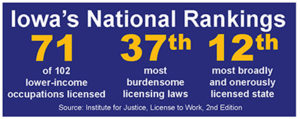Iowa’s Middle Income Workers Hit With Regulations
February 8, 2019Iowa's Middle Income Workers Hit With Regulations
Iowa's occupational licensing is one of the worst in the nation for lower-to-middle income workers according to the 2nd Edition of Institute for Justice's License to Work study.
Of 102 occupations that were reviewed, Iowa requires 71 of those occupations to pay for training and certification. This may be limiting entry into those jobs and reducing competition.

Iowans who want to pursue their careers should not be stymied by unnecessary government regulation. For instance, barbers in Iowa must demonstrate almost 20 times more experience than an Emergency Medical Technician! Cosmetologists must complete 2,100 hours of training.
As a result, fewer new jobs and businesses are being created in Iowa than in other states. Since 2010, Iowa has remained below the national average in job creation and population growth. Until Iowa addresses the bureaucratic barriers for people to use their skills, serve others, and earn a living, we will continue to see people leave the state for opportunities elsewhere or choose other states over Iowa.
ITR President Chris Ingstad sat down with former Nebraska State Senator Laura Ebke, Senior Fellow for Job Licensing with the Platte Institute, to discuss occupational licensing. Ebke said, "When government gets in the way it is hard for people to take chances." Watch some of the interview below:
What can be done? The Iowa legislature can ensure citizens can pursue their careers and employment opportunities by:
- Reviewing all existing licensing requirements
- Repealing licenses that are not necessary to protect the health and safety of the public
- Modifying licensing laws that are not competitive
- Enacting sunset review provisions so that all licensing laws are reviewed periodically
- Reviewing licensing boards
While some oversight and licensing will always be necessary, Iowa may be going too far. The legislature should not throw all occupational licenses out the window. They should, however, review all existing licenses to determine if licensure is still needed, and if so, determine if the licensing requirements are still appropriate (and competitive) for the occupation.
Related Posts

Occupational Licensing Reform

Gov’t Standing in the Way of A Basic Freedom

2021 Tax Day Virtual Luncheon

Iowa and Nebraska Should Trade Playbooks

Lather, Rinse, Repeat; More Reform is Still Needed

Major Licensing Reforms Deliver Opportunity

Legislative Success! Occupational Licensing Reform

Removing Excessive Licensing Regulations

Show Me Reform

Cutting Bureaucratic Red Tape
